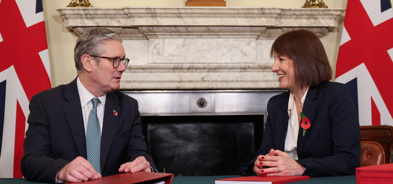Budget 2020: highlights and key changes
Rishi Sunak announces £30 billion of fiscal stimulus for the UK economy following the impact of coronavirus. No attempt was made at major reform in pensions or personal taxation.
The value of investments can fall as well as rise and that you may not get back the amount you originally invested.
Nothing in these briefings is intended to constitute advice or a recommendation and you should not take any investment decision based on their content.
Any opinions expressed may change or have already changed.
Written by Graham Walker
Published on 12 Mar 20203 minute read

The Chancellor focused on the inevitable economic impact of coronavirus in the 2020 Budget by announcing £30 billion of fiscal stimulus for the UK economy.
Whilst there were tweaks to pensions tax relief aimed at simplifying the position of senior NHS staff, no attempt was made at major reform here or in other complex areas of personal taxation such as Inheritance Tax.
“Expensive” and “unfair” Entrepreneurs’ Relief survives, but with a reduced lifetime limit from 11 March.
There will be greater opportunity to invest tax free for children with a jump in the Junior ISA subscription limit to £9,000 from April.
Personal Taxes
Income Tax
- The personal allowance will remain at £12,500 for the 2020/21 tax year
- There are no changes to the £5,000 savings rate band, £2,000 dividend allowance or the £1,000 savings allowance
Capital Gains Tax
- The Capital Gains Tax allowance will increase by £300 to £12,300 from April 2020
- Entrepreneur’s Relief will be restricted by reducing the Lifetime Limit from £10 million to £1 million
Inheritance Tax
- There were no changes announced for Inheritance Tax
- The Nil Rate Band remains fixed at £325,000 and the Residence Nil Rate band will increase to £175,000 as previously planned
- Despite previous speculation, there were no changes to Business Relief on AIM shares or other tax-advantaged investments
National Insurance
- The threshold above which National Insurance becomes payable will be raised from £8,632 to £9,500
Investments
Pensions
Tapered Annual Allowance
- From 6 April 2020 the adjusted income and threshold income limits will be increased by £90,000 to £240,000 and £200,000 respectively
- Individuals whose threshold income is below £200,000 will not be affected by tapering
- Their annual allowance will only start to be tapered when this £200,000 threshold is breached and their adjusted income exceeds £240,000
- The minimum level to which the annual allowance can taper down will reduce from £10,000 to £4,000. This means that all those with adjusted income of £312,000 or over will have an annual allowance of £4,000
- It will still be possible to use ‘carry forward’ to mop up unused relief from the previous three tax years
The Lifetime Allowance
- From 6 April 2020 the Lifetime Allowance will be increased in line with CPI to £1,073,100 from its current level of £1,055,000. The Lifetime Allowance is the maximum amount of tax-privileged pension saving an individual can build up without having to pay additional tax
NHS Pensions
- As you will be aware over the last year the Government has been under huge pressure to solve the NHS Pension crisis which has been caused by many GPs reducing their hours in order to avoid tax penalties on their pensions. This has resulted in longer waiting times for patients to receive treatment and thus caused a great deal of disquiet
- In response to these concerns the Government has in the Budget today announced new measures which will resolve the problem for circa 98% of GPs. The upshot is that only those people who are earning in excess of £200,000 will suffer the tax charges on their NHS pensions
ISAs
- From 6 April 2020 the annual subscription limit for ISAs remains at £20,000 but the limit for Junior ISAs and Child Trust Funds will be increased from £4,368 to £9,000
Investment Bonds
- Amendments will be made to the legislation on Top-slicing Relief to clarify how allowances and reliefs can be set against life insurance policy gains. This measure will apply to all relevant gains occurring on or after 11 March 2020
Tax Advantaged Investments
- There are no changes to SEIS, EIS, VCT or IHT Business Relief investments
Other Taxes
Stamp duty
- From April 2021 there will be a 2% surcharge for non-UK residents purchasing UK residential property
Corporation Tax
- The rate of Corporation Tax will remain at 19% for 2020/21
We hope you have found this update helpful. Please do get in touch on 020 7189 9999 if you have any queries or would like more information.
Get insights and events via email
Receive the latest updates straight to your inbox.
You may also like…


Market news
2024 Autumn Budget Overview: The key announcements from Chancellor Rachel Reeves




